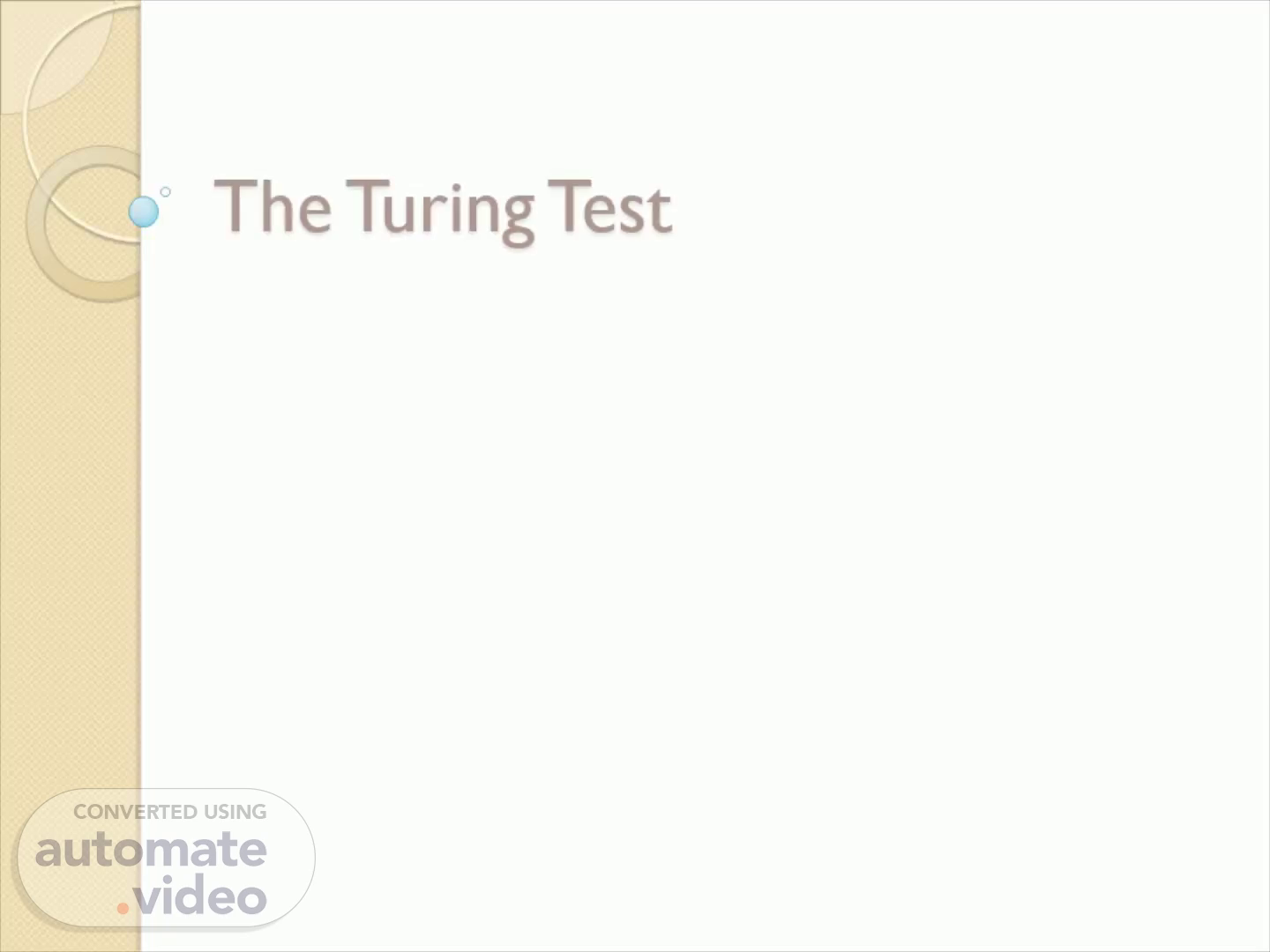Scene 1 (0s)
[Audio] Welcome. My final project is on the Turing Test. Computers have come a long way over the decades, but just how far? We'll see one interesting investigation that will perhaps give us some answers..
Scene 2 (17s)
[Audio] So, can a computer fake being human? The turing test is an examination by interrogation that can allow us to tell. We'll ask the same questions of a human and a computer and try to tell which one's which based on the answers..
Scene 3 (34s)
[Audio] Here's a picture that shows how the test is done. A questioner asks the same question to a human and to a machine. The questioner is behind a wall and will have to determine which is which by asking questions and getting answers. The number of questions could be large, and the test might take a while..
Scene 4 (56s)
[Audio] We assume the two behind the wall are equivalent and ask questions that may show otherwise. The questions themselves have to be general: the idea is to see if the claimed equivalence holds under all situations, and not just a few, like in a structured online chat setting. Although domain-specific questioning renders the two interchangeable in a specific circumstance, the test is more general than that, and questions cannot be specified in advance..
Scene 5 (1m 27s)
[Audio] We can, though, stay in a walled garden of sorts and confine questioning to a specific area called a domain. This could make things easier—it's possible. How could you, for example, apply this test to see if I'm a computer rather than a human? Let's hold off on that for the time being and discuss a real political lightning rod…what, though?.
Scene 6 (1m 53s)
[Audio] That's right… labor! We'll chat about labor for a bit..
Scene 7 (2m 21s)
[Audio] Is that machine over there a replacement for a human in the labor domain? Are the two interchangeable? In technical roles, the answer is yes. Is your job technical? Well, yes, if it is not creative. Let me explain some. Some jobs are more technical than others: think procedures, rules, deductions, and other exactitudes. Creative jobs aren't technical, and have shades of gray. That idea of yours isn't the product of a deduction, else it's technical..
Scene 8 (3m 1s)
[Audio] Technological progress " deskills" labor by making functions performed by humans tractable to machines; such labor is called "technical," as opposed to "purely creative." The creative frontier divides the technical and creative aspects of the job. Technology moves the creative frontier forward, allowing machines to do more parts of the job..
Scene 9 (3m 26s)
[Audio] Some jobs have been completely automated, while others appear to use technology as a help, rather than a substitute. In the case of a calculator, machines have passed a domain-specific Turing test. Other roles have a creative component: a questioner asking questions about a particular topic would eventually tell apart the machine from the human..
Scene 10 (3m 52s)
[Audio] So has anyone looked for such domain equivalence? Yes. Researchers looked at jobs within the UK's national healthcare system and broke them into parts. The authors assigned automation scores to each part, with the idea that technical aspects of certain jobs could not only be bifurcated away from nontechnical ones, but could be automated too. One domestic example is the Unit Secretary position—now long gone at most places..
Scene 11 (4m 23s)
[Audio] Despite the authors' reputation, many did not respond. In fact, less than one in three did, as is shown here. One role—Scanning Clerk—was found "completely automatable," while others had only a smaller (about 10% or less) component that could be automated. This is evidence of domain-specific equivalence between human and computer and full development of the creative frontier in at least one case..
Scene 12 (4m 53s)
[Audio] So, some important takeaways. It appears a machine can substitute for a human in at least one case. In a world of scarce resources, humans might prefer inefficiency, asking their domain-specific equivalent counterparts to "stay out of my domain." Importantly, a questioner confining interrogation to the domain discussed here would not be able to tell a human and computer apart..
Scene 13 (5m 20s)
[Audio] If you have any questions, please feel free to ask..
Scene 14 (5m 26s)
[Audio] And here are my references. Thanks for watching!.
